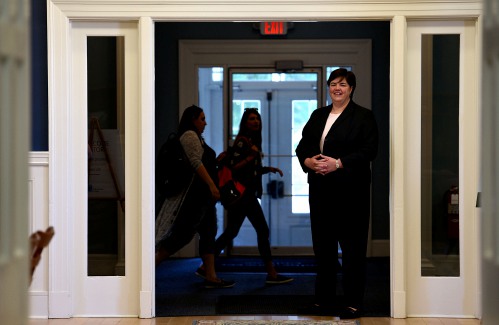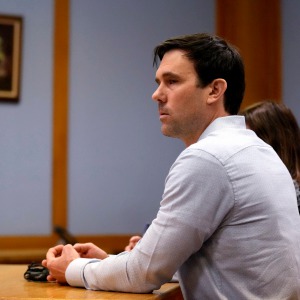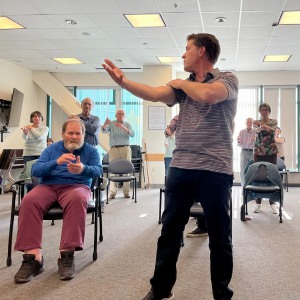
Colby-Sawyer president announces plan to depart
NEW LONDON — After eight years at the helm of Colby-Sawyer College, Sue Stuebner will depart in June to take up the mantle as president of Marietta College in Ohio.Under Stuebner’s tenure, Colby-Sawyer’s endowment doubled — from $36 million in 2016 to...

Under covered work
Isaac Jenson, left, and Randy Buzzell of Isaac’s Excavating and Construction, work on their second day of a project to install a 10-inch ductile iron sewer line under the Packard Hill Covered Bridge in Lebanon on Wednesday. About 900 feet of sewer...
Most Read
 Herd departs Hartford’s last remaining dairy farm
Herd departs Hartford’s last remaining dairy farm
 Bald eagles are back, but great blue herons paid the price
Bald eagles are back, but great blue herons paid the price
 At Dartmouth, hundreds protest ongoing war in Gaza and express support for academic freedom
At Dartmouth, hundreds protest ongoing war in Gaza and express support for academic freedom
 Kenyon: What makes Dartmouth different?
Kenyon: What makes Dartmouth different?
 A Life: Richard Fabrizio ‘was not getting rich but was doing something that made him happy’
A Life: Richard Fabrizio ‘was not getting rich but was doing something that made him happy’
Editors Picks
 Herd departs Hartford’s last remaining dairy farm
Herd departs Hartford’s last remaining dairy farm
 A Life: Richard Fabrizio ‘was not getting rich but was doing something that made him happy’
A Life: Richard Fabrizio ‘was not getting rich but was doing something that made him happy’
 Kenyon: What makes Dartmouth different?
Kenyon: What makes Dartmouth different?
 Editorial: Parker parole a reminder of how violence reshapes our lives
Editorial: Parker parole a reminder of how violence reshapes our lives
Sports

Volunteers work to repair Upper Valley trails damaged by storms
WOODSTOCK — The Ottauquechee River Trail averaged around 500 visitors a week during peak months until last July’s flooding, which left behind debris along the trail, which begins at East End Park off Route 4.The roughly 3-mile trail in downtown...
 Local Roundup: Hanover hangs on for 11-9 softball win over Lebanon
Local Roundup: Hanover hangs on for 11-9 softball win over Lebanon
 Bears ride strong 2nd half to win in girls lacrosse
Bears ride strong 2nd half to win in girls lacrosse
 Woodstock boys lax defense steps up, holds off Hartford
Woodstock boys lax defense steps up, holds off Hartford
Opinion

Editorial: Chris Sununu’s moral vacuum
New Hampshire Gov. Chris Sununu’s conversion from “Never Trump” to “Ever Trump” occurred not on the road to Damascus but on the Republican Party’s road to perdition.On ABC News last Sunday, Sununu affirmed his intention to support Donald Trump for...
 Editorial: Gambling tarnishes America’s sporting life
Editorial: Gambling tarnishes America’s sporting life
 By the Way: A white nationalist’s many mistruths
By the Way: A white nationalist’s many mistruths
 Column: The age-old question of what to read
Column: The age-old question of what to read
 Editorial: Transparency wins in NH Supreme Court ruling
Editorial: Transparency wins in NH Supreme Court ruling

Photos

Spring cleanup in Lebanon
 Drawn to dragons
Drawn to dragons
 Clear and free in Hartford
Clear and free in Hartford
 Ramping up their foraging
Ramping up their foraging
 Roadside assist in Bethel
Roadside assist in Bethel
Arts & Life

Bald eagles are back, but great blue herons paid the price
After years of absence, the most patriotic bird in the sky returned to Vermont — but it might’ve come at another’s expense.Vermont finally took the bald eagle off of its endangered species list in 2022 following years of reintroduction efforts...
 JAG Productions announces closure, citing ‘crisis facing the arts’
JAG Productions announces closure, citing ‘crisis facing the arts’
 How a hurricane and a cardinal launched a UVM professor on a new career path
How a hurricane and a cardinal launched a UVM professor on a new career path
Obituaries
 Helen P. Bridge
Helen P. Bridge
New London, NH - Helen P. Bridge never met a story she didn't love to tell, nor one she couldn't improve. Given her 96 years of living life to the fullest, she had plenty to share. She was born the youngest of 11 children on November 18... remainder of obit for Helen P. Bridge
 Rosalie Mary Cutter
Rosalie Mary Cutter
Lebanon, NH - Rosalie Mary (Goodrich) Cutter, 93, passed away on April 26, 2024. Born in East Orange, VT on May 31, 1930, she was the youngest of ten children of Grace Lincoln Goodrich. The family moved to Norwich, VT when she was y... remainder of obit for Rosalie Mary Cutter
 Gail J. Farrar
Gail J. Farrar
Ascutney, VT - Gail J. Farrar, age 96, passed Tuesday, February 6, 2024. A graveside service will be held in the Cavendish Village Cemetery at 2pm on Saturday, May 4, 2024. Knight Funeral Home in Windsor, VT has been entrusted with ... remainder of obit for Gail J. Farrar
 Cynthia Beam
Cynthia Beam
North Haverill, NH - Cynthia J. Beam of North Haverhill, NH passed away at the age of 68, on April 13, 2024. Cynthia was born on May 20, 1955 in Lawrence MA to John and Marguerite (Hallock) Beam. Names she was known for were CJ, Cyndi, ... remainder of obit for Cynthia Beam


 Parkinson's impairs movement. This group dances to keep the symptoms at bay.
Parkinson's impairs movement. This group dances to keep the symptoms at bay.
 Howard Dean weighs (another) run for governor
Howard Dean weighs (another) run for governor
 Windsor man who failed to show up for trial arrested in Hartland
Windsor man who failed to show up for trial arrested in Hartland
 Pro-Palestinian protest encampments spring up at the University of Vermont, Middlebury College
Pro-Palestinian protest encampments spring up at the University of Vermont, Middlebury College

 Out & About: Newport art center’s exhibition celebrates homes of all varieties
Out & About: Newport art center’s exhibition celebrates homes of all varieties
